Artículo
Perigestational alcohol consumption induces altered early placentation and organogenic embryo growth restriction by disruption of trophoblast angiogenic factors
Gualdoni, Gisela Soledad ; Ventureira, Martín Ricardo
; Ventureira, Martín Ricardo ; Coll, Tamara Anahí
; Coll, Tamara Anahí ; Palomino, Wilder Alberto; Barbeito, Claudio Gustavo
; Palomino, Wilder Alberto; Barbeito, Claudio Gustavo ; Cebral, Elisa
; Cebral, Elisa
 ; Ventureira, Martín Ricardo
; Ventureira, Martín Ricardo ; Coll, Tamara Anahí
; Coll, Tamara Anahí ; Palomino, Wilder Alberto; Barbeito, Claudio Gustavo
; Palomino, Wilder Alberto; Barbeito, Claudio Gustavo ; Cebral, Elisa
; Cebral, Elisa
Fecha de publicación:
03/2021
Editorial:
Reproductive Healthcare Ltd
Revista:
Reproductive Biomedicine Online
ISSN:
1472-6483
Idioma:
Inglés
Tipo de recurso:
Artículo publicado
Clasificación temática:
Resumen
Research question: Maternal alcohol consumption produces fetal retardation and malformations, probably associated with placental defects. Does perigestational alcohol consumption up to organogenesis lead to abnormal placentation and embryo growth restriction by disrupting the vascular endothelial growth factor (VEGF) system in embryo–placental development? Design: Female mice were treated with 10% ethanol in drinking water before and up to day 10 of gestation. Control mice received ethanol-free water. After treatment, the trophoblastic tissue, embryo growth and the angiogenic VEGF pathway were analysed. Results: Female mice who had received treatment had resorbed and delayed implantation sites with poor ectoplacental cone development. Reduced trophoblastic area tissue from female mice who had received treatment had abnormal junctional zone and diminished labyrinthine vascularization. After treatment, the labyrinth had increased chorionic trophoblast proliferation, hypoxia inducible factor-1α immunoexpression but reduced apoptosis. The embryo growth was reduced concomitantly with low VEGF immunostaining but high endothelial nitric oxide synthase (eNOS) expression. In junctional and labyrinth of treated female mice, gene and protein immunoexpression of VEGF was reduced and the protein expression of FLT-1 increased compared with controls. Increased activation of kinase insert domain receptor receptor (phosphorylated KDR) and expression of eNOS were observed in placenta of treated female mice. Immunoexpression of metalloproteinase-9, however, was reduced in junctional zone but increased in labyrinth, compared with controls. Conclusions: These data reveal inadequate expression of VEGF/receptors and angiogenic eNOS and metalloproteinase factors related to abnormal early placentation after perigestational alcohol ingestion, providing insight into aetiological factors underlying early placentopathy associated with intrauterine growth restriction caused by maternal alcohol consumption.
Archivos asociados
Licencia
Identificadores
Colecciones
Articulos(CCT - LA PLATA)
Articulos de CTRO.CIENTIFICO TECNOL.CONICET - LA PLATA
Articulos de CTRO.CIENTIFICO TECNOL.CONICET - LA PLATA
Citación
Gualdoni, Gisela Soledad; Ventureira, Martín Ricardo; Coll, Tamara Anahí; Palomino, Wilder Alberto; Barbeito, Claudio Gustavo; et al.; Perigestational alcohol consumption induces altered early placentation and organogenic embryo growth restriction by disruption of trophoblast angiogenic factors; Reproductive Healthcare Ltd; Reproductive Biomedicine Online; 42; 3; 3-2021; 481-504
Compartir
Altmétricas



